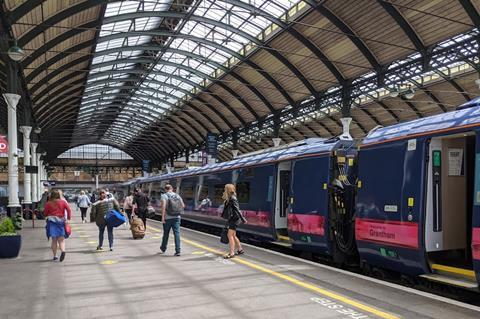
UK: The Rail Partners association of train operator owning groups has called for changes which it says are needed to prevent lower post-pandemic revenues, rising industry costs and delays to reform triggering a ‘spiral of decline’ with a ‘protracted hiatus, stunted recovery from the pandemic and most likely a permanently smaller railway’.
Rail Partners makes four recommendations to the Department for Transport in its The Fork in the Tracks: Attracting customers back to the railway report published on November 29. These are to:
- activate existing unused mechanisms in operators’ current National Rail Contracts to enable them to ‘invest and innovate’ to generate revenue growth in 2023-24 and beyond;
- provide operators with more influence over timetabling, marketing and fares, so they can attract passengers and grow the market;
- create mechanisms in future Passenger Service Contracts that are in keeping with ambitions in the Plan for Rail (previously the Williams-Shapps Plan for Rail) to create a spectrum of contracts adapted to commuter, long-distance and other types of service;
- take a holistic view of costs and revenue, and avoid focusing solely on cost reduction ‘that is negatively impacting the customer experience and revenue generation’.
Rail Partners says revenue has plateaued at 80% to 85% of pre-pandemic levels, while fixed costs are constant. The additional £1·5bn to £2bn/year currently required from taxpayers is ‘unsustainable’, but Rail Partners says the government is focusing on cutting costs without considering the wider impact.
‘The gap in rail finances cannot be closed by cost savings alone’, said Chief Executive Andy Bagnall. ‘A sole focus on reducing costs risks a spiral of decline, with cuts to services putting passengers off using rail, leading to further cost pressures and further cuts.’
Operators wishing to run a marketing campaign now need to obtain permission from DfT through a ‘protracted’ process, and while owning groups are willing to invest, there is no mechanism for them to make returns on doing so. Rail Partners says no commercial business would operate in this way.
Capture the best
The report says ‘franchising as a system had run its course even before the pandemic’, but the track record of the private sector ‘cannot be ignored’ and ‘it is therefore critical to capture the best of that acumen, harness it appropriately so that the commercial expertise drives up revenue, avoids a spiral of decline and ultimately achieves the core objectives of the Plan for Rail’.
Bagnall said ‘if we don’t challenge the status quo and overhaul the contractual model on the railways to enable operators to better attract customers, our research shows the Treasury will miss out on nearly £1·6bn in revenue over the next two years’.
Responding to the Rail Partners report, a DfT spokesperson told Rail Business UK ‘we work closely with operators to ensure their contracts deliver for passengers and taxpayers, welcoming all ideas to incentivise them to grow revenues, and we look forward to working with all partners to achieve this outcome.
‘More widely, we’re committed to modernising the industry to ensure it’s sustainable, reliable and attractive to customers.’
Rail contracts since the pandemic
Emergency Measures Agreements
At the start of the pandemic franchises were suspended and EMAs put in place, with DfT covering all lost revenue and operational costs and paying operators a pre-determined fee. This was designed to enable operators to focus on providing essential transport services during a national crisis.
Emergency Recovery Measures Agreements
The EMAs expired after six months and were replaced with ERMAs running for six to 18 months. The terms were similar to EMAs, but the total fee paid reduced.
National Rail Contracts
The majority of operators have now moved from ERMAs to NRCs, which formally terminated the pre-existing franchises. NRCs are directly-awarded bridging contracts until new Passenger Service Contracts are introduced under the Plan for Rail. The maximum fee available in most NRCs is 2·0% or lower of the operator’s cost base, typically split between a 0·5% fixed fee and 1·5% performance-based fee. NRCs place more responsibility for managing cost onto operators, but Rail Partners says there is little commercial freedom or incentive to accelerate growth.
Passenger Service Contracts
The PSCs envisaged under the Plan for Rail would offer long-distance and mixed-market operators more commercial freedom in timetabling, fares and marketing, within a framework set by Great British Railways. Commuter services would be operated under more tightly specified concessions, though Rail Partners would like to see more freedom than under NRCs in areas such as off-peak yield management, marketing and the wider customer service offer.



